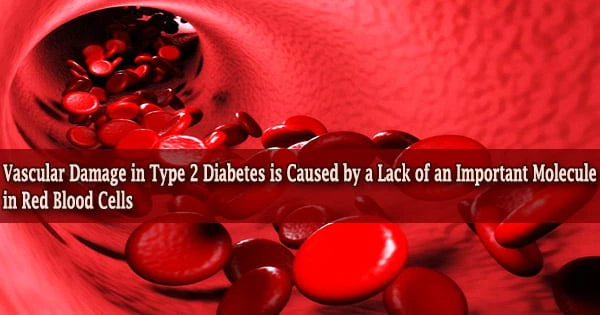In type 2 diabetes, altered red blood cell activity leads to vascular damage. Low levels of a key protein in red blood cells produce this effect, according to findings from a new study in cells from type 2 diabetes patients and mice. Researchers from Sweden’s Karolinska Institutet published their findings in the journal Diabetes.
Type 2 diabetes is a chronic illness that prevents your body from properly utilizing insulin. Insulin resistance is a term used to describe the condition of people with type 2 diabetes. This type of diabetes is more common in people in their forties and fifties.
It was previously known as adult-onset diabetes. Type 2 diabetes, on the other hand, affects children and teenagers, owing to childhood obesity. Type 2 diabetes symptoms might be so subtle that they go unnoticed. It affects around 8 million people who are unaware of it.
Patients with type 2 diabetes are fully aware that they have a higher risk of cardiovascular disease. Type 2 diabetes can cause blood vessel damage over time, which can lead to life-threatening consequences like heart attack and stroke.
The findings demonstrate a previously unrecognized cause of vascular injury in type 2 diabetes. We hope that the results will pave the way for new therapies that increase red blood cell microRNA-210 levels and thereby prevent vascular injury in patients with type 2 diabetes.
Zhichao Zhou
The disease pathways underlying cardiovascular injury in type 2 diabetes, on the other hand, are mainly unclear, and there are presently no medications available to avoid such injuries.
Recent studies have revealed that red blood cells, whose primary purpose is to deliver oxygen to internal organs, become dysfunctional in type 2 diabetes and can act as mediators of vascular problems.
Researchers at Karolinska Institutet investigated which molecular alterations in red blood cells could explain the deleterious effects of type 2 diabetes in cells from patients with the disease and mice in the current study.
The researchers discovered that red blood cells from 36 patients with type 2 diabetes had significantly lower amounts of the tiny molecule microRNA-210 than red blood cells from 32 healthy subjects.
Micro-RNAs are a type of molecule that regulates vascular function in people with diabetes and other diseases.
MicroRNA-210 deficiency resulted in changes in particular vascular protein levels as well as reduced blood vessel endothelial cell activity. Restoration of microRNA-210 levels in red blood cells inhibited the development of vascular damage in laboratory experiments by causing particular biochemical alterations.
“The findings demonstrate a previously unrecognized cause of vascular injury in type 2 diabetes,” says Zhichao Zhou, researcher at the Department of Medicine, Solna, Karolinska Institutet, who conducted the study in collaboration with among others Professor John Pernow at the same department.
“We hope that the results will pave the way for new therapies that increase red blood cell microRNA-210 levels and thereby prevent vascular injury in patients with type 2 diabetes.”





